全国通用 2022届高考英语3500词汇表达+阅读训练(DAY 26)word版含答案及解析
文档属性
| 名称 | 全国通用 2022届高考英语3500词汇表达+阅读训练(DAY 26)word版含答案及解析 | 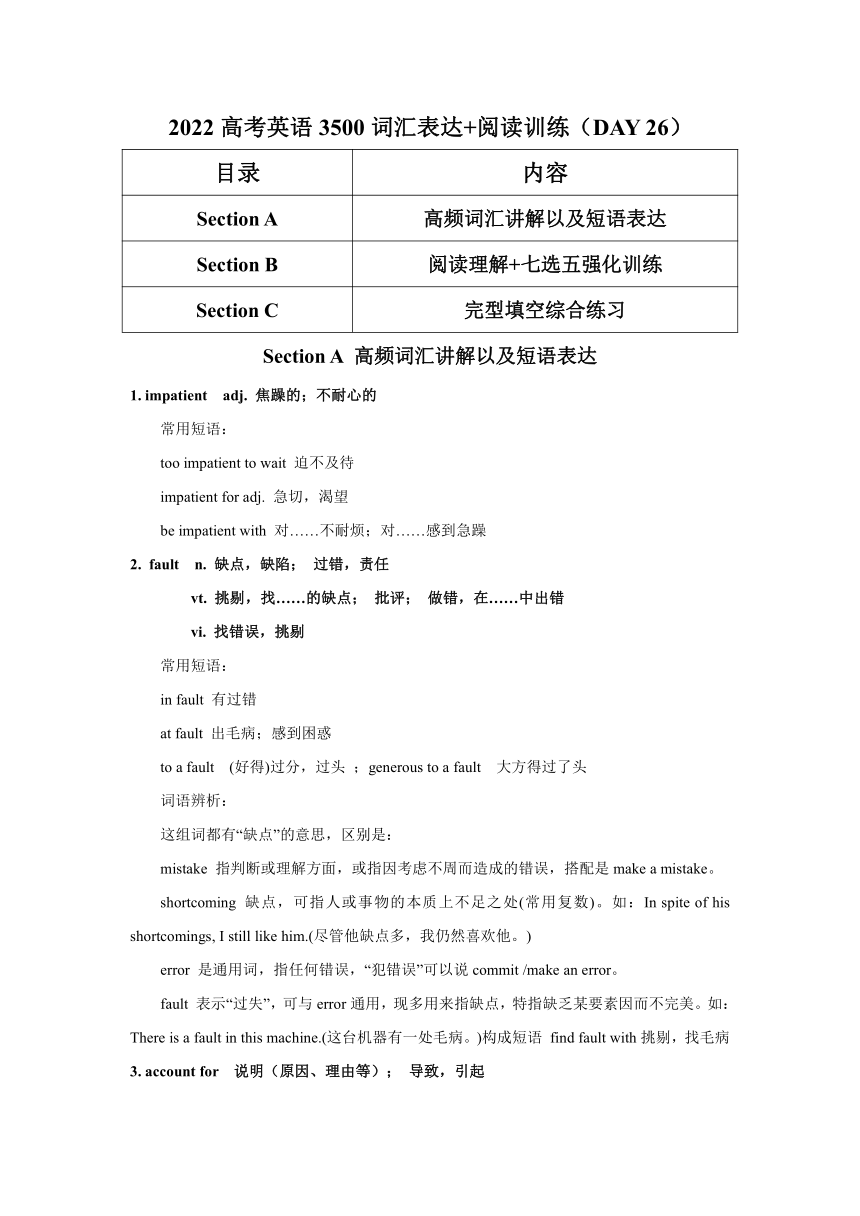 | |
| 格式 | zip | ||
| 文件大小 | 60.5KB | ||
| 资源类型 | 教案 | ||
| 版本资源 | 通用版 | ||
| 科目 | 英语 | ||
| 更新时间 | 2021-07-28 11:28:30 | ||
图片预览

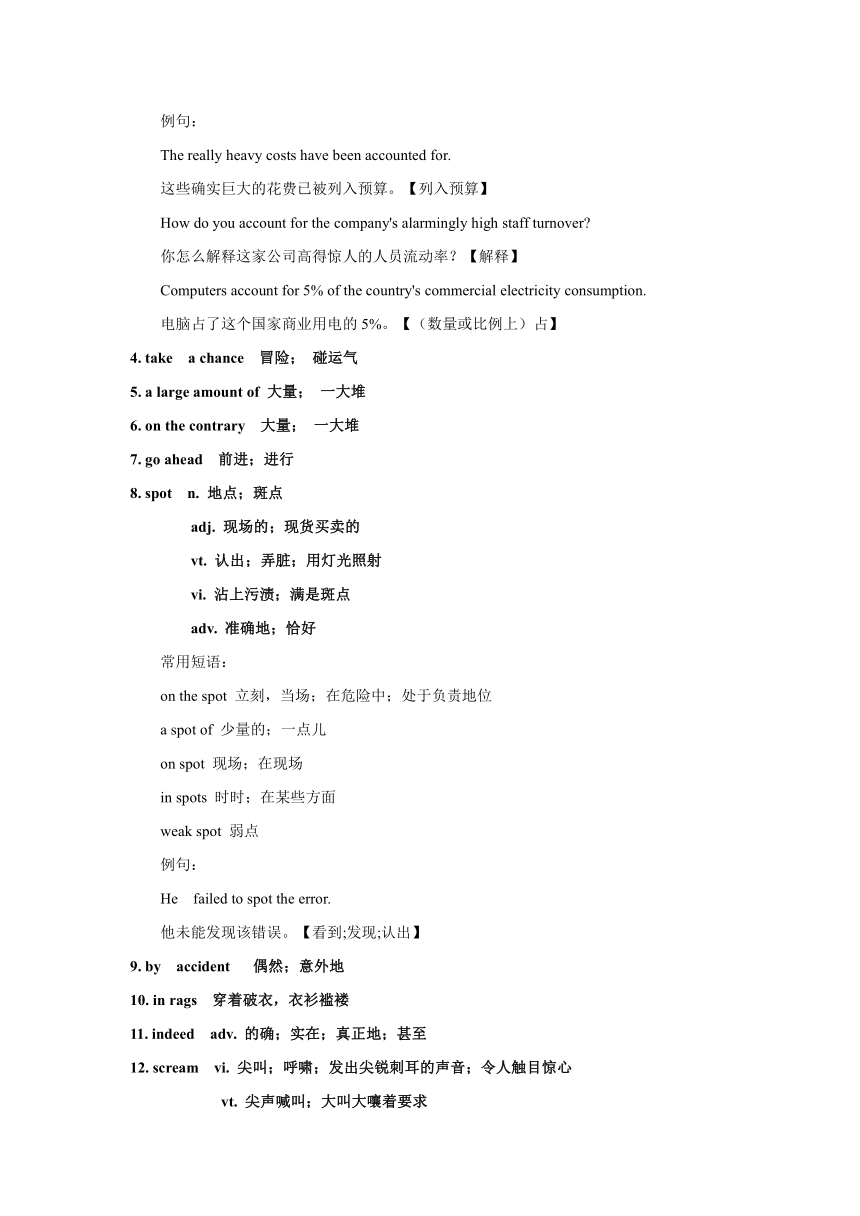
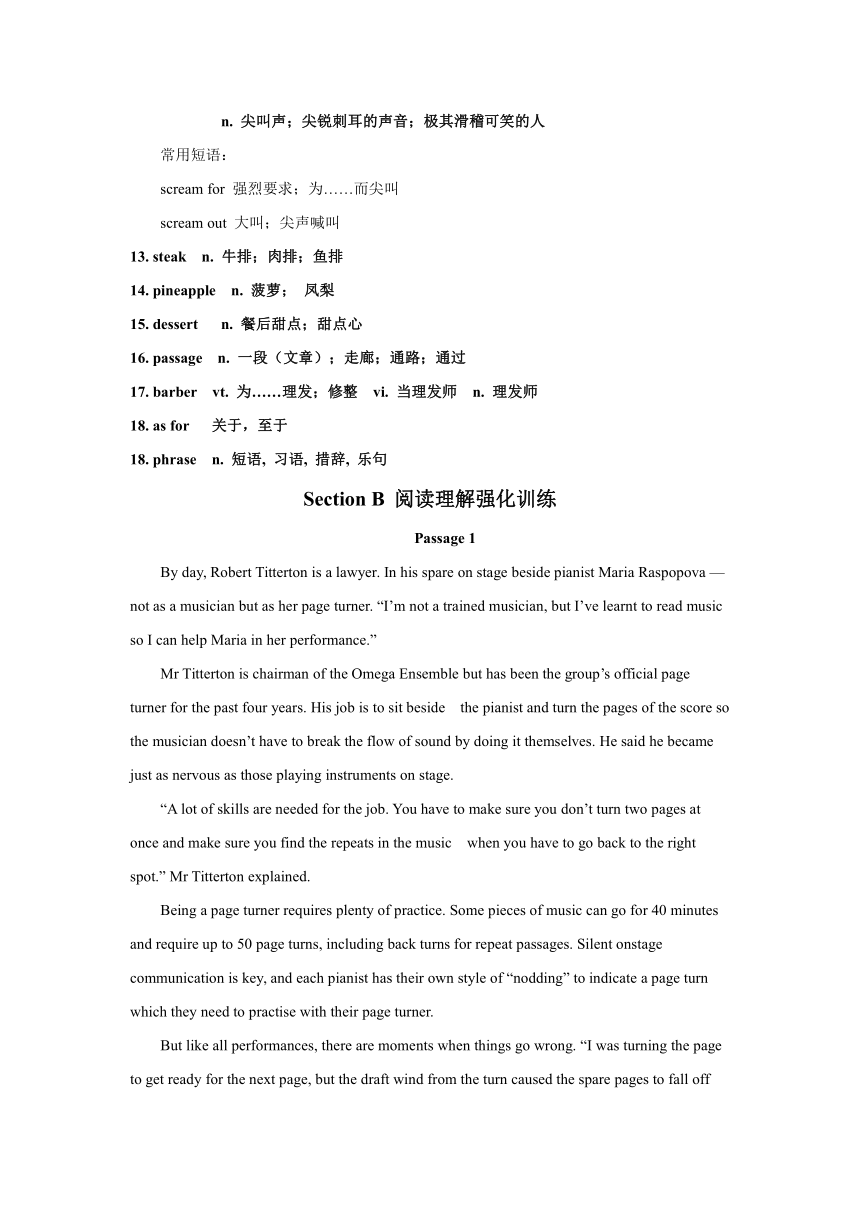
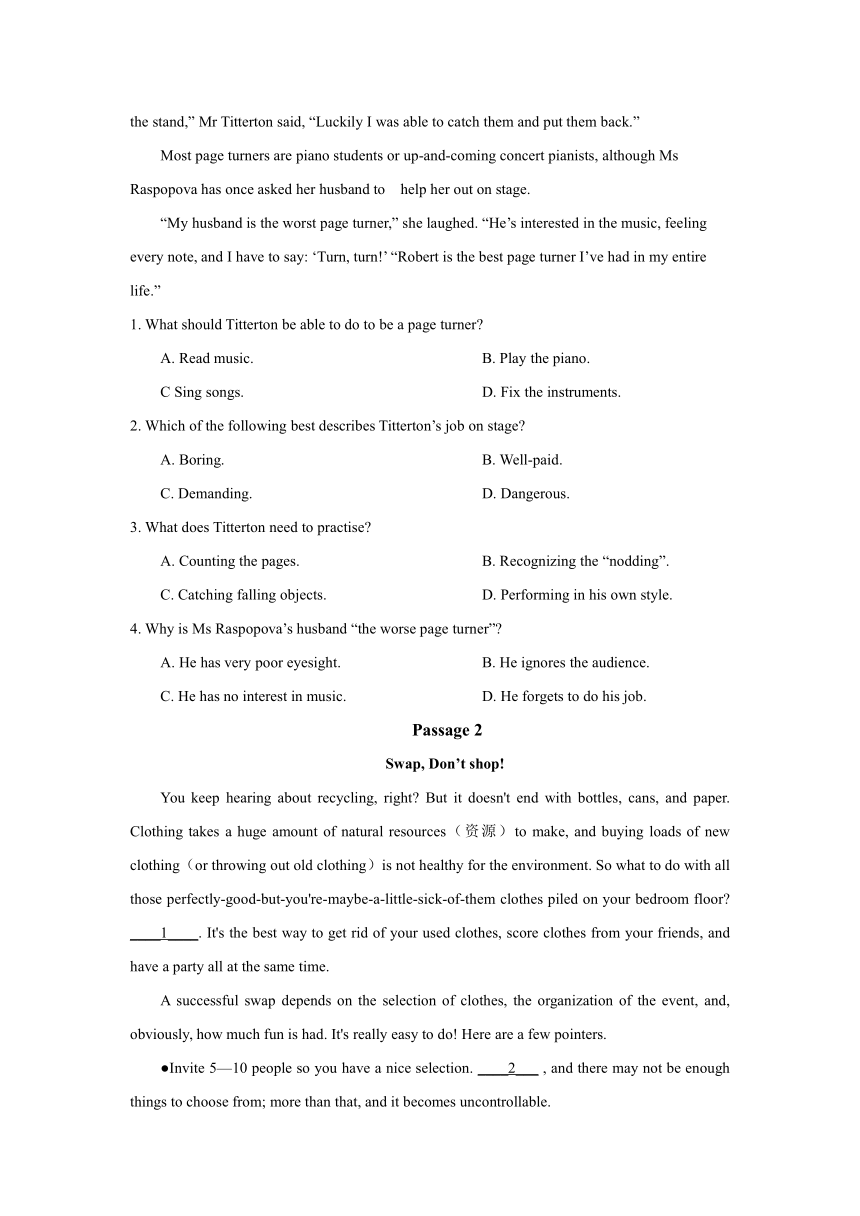
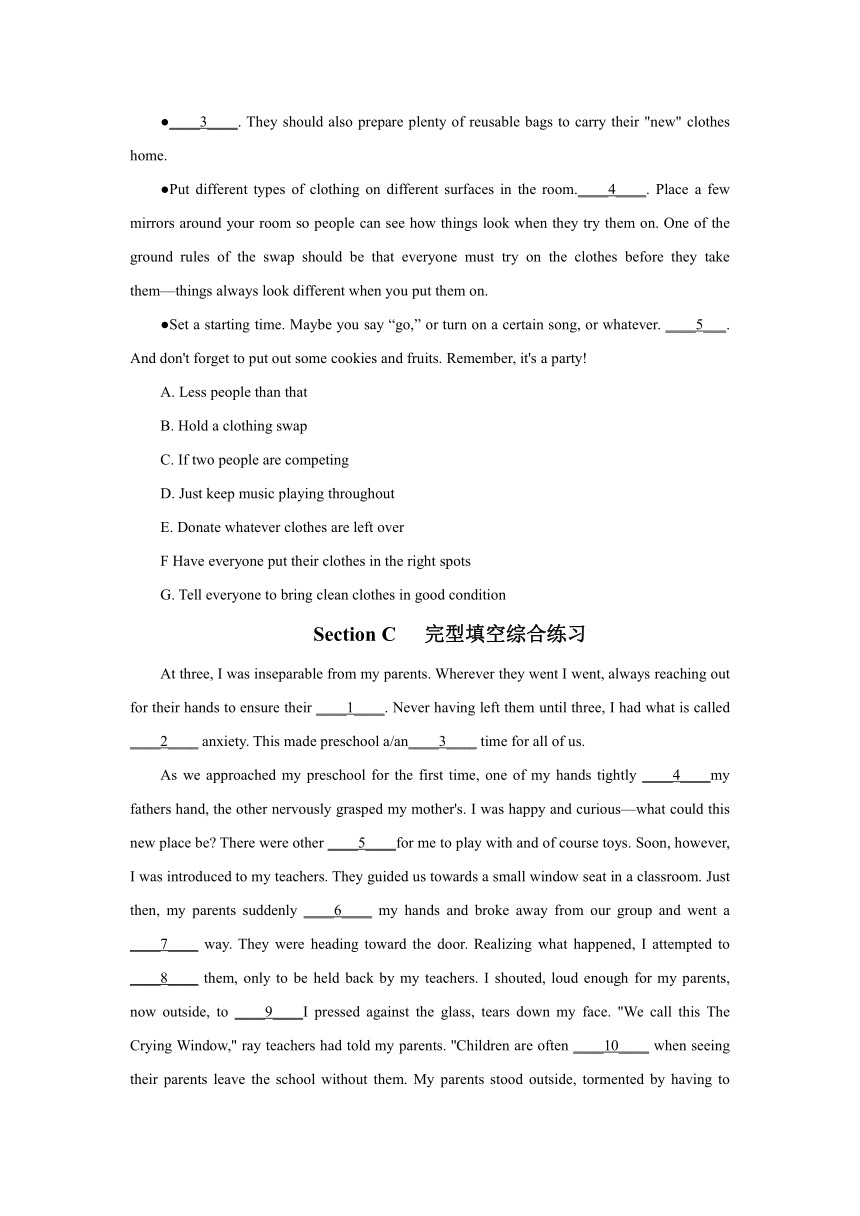
文档简介
2022高考英语3500词汇表达+阅读训练(DAY
26)
目录
内容
Section
A
高频词汇讲解以及短语表达
Section
B
阅读理解+七选五强化训练
Section
C
完型填空综合练习
Section
A
高频词汇讲解以及短语表达
1.
impatient
adj.
焦躁的;不耐心的
常用短语:
too
impatient
to
wait
迫不及待
impatient
for
adj.
急切,渴望
be
impatient
with
对……不耐烦;对……感到急躁
fault
n.
缺点,缺陷;
过错,责任
vt.
挑剔,找……的缺点;
批评;
做错,在……中出错
vi.
找错误,挑剔
常用短语:
in
fault
有过错
at
fault
出毛病;感到困惑
to
a
fault
(好得)过分,过头
;generous
to
a
fault
大方得过了头
词语辨析:
这组词都有“缺点”的意思,区别是:
mistake
指判断或理解方面,或指因考虑不周而造成的错误,搭配是make
a
mistake。
shortcoming
缺点,可指人或事物的本质上不足之处(常用复数)。如:In
spite
of
his
shortcomings,
I
still
like
him.(尽管他缺点多,我仍然喜欢他。)
error
是通用词,指任何错误,“犯错误”可以说commit
/make
an
error。
fault
表示“过失”,可与error通用,现多用来指缺点,特指缺乏某要素因而不完美。如:There
is
a
fault
in
this
machine.(这台机器有一处毛病。)构成短语
find
fault
with挑剔,找毛病
3.
account
for
说明(原因、理由等);
导致,引起
例句:
The
really
heavy
costs
have
been
accounted
for.
这些确实巨大的花费已被列入预算。【列入预算】
How
do
you
account
for
the
company's
alarmingly
high
staff
turnover?
你怎么解释这家公司高得惊人的人员流动率?【解释】
Computers
account
for
5%
of
the
country's
commercial
electricity
consumption.
电脑占了这个国家商业用电的5%。【(数量或比例上)占】
4.
take
a
chance
冒险;
碰运气
5.
a
large
amount
of
大量;
一大堆
6.
on
the
contrary
大量;
一大堆
7.
go
ahead
前进;进行
8.
spot
n.
地点;斑点
adj.
现场的;现货买卖的
vt.
认出;弄脏;用灯光照射
vi.
沾上污渍;满是斑点
adv.
准确地;恰好
常用短语:
on
the
spot
立刻,当场;在危险中;处于负责地位
a
spot
of
少量的;一点儿
on
spot
现场;在现场
in
spots
时时;在某些方面
weak
spot
弱点
例句:
He
failed
to
spot
the
error.
他未能发现该错误。【看到;发现;认出】
9.
by
accident
偶然;意外地
10.
in
rags
穿着破衣,衣衫褴褛
11.
indeed
adv.
的确;实在;真正地;甚至
12.
scream
vi.
尖叫;呼啸;发出尖锐刺耳的声音;令人触目惊心
vt.
尖声喊叫;大叫大嚷着要求
n.
尖叫声;尖锐刺耳的声音;极其滑稽可笑的人
常用短语:
scream
for
强烈要求;为……而尖叫
scream
out
大叫;尖声喊叫
13.
steak
n.
牛排;肉排;鱼排
14.
pineapple
n.
菠萝;
凤梨
15.
dessert
n.
餐后甜点;甜点心
16.
passage
n.
一段(文章);走廊;通路;通过
17.
barber
vt.
为……理发;修整
vi.
当理发师
n.
理发师
18.
as
for
关于,至于
18.
phrase
n.
短语,
习语,
措辞,
乐句
Section
B
阅读理解强化训练
Passage
1
By
day,
Robert
Titterton
is
a
lawyer.
In
his
spare
on
stage
beside
pianist
Maria
Raspopova
—
not
as
a
musician
but
as
her
page
turner.
“I’m
not
a
trained
musician,
but
I’ve
learnt
to
read
music
so
I
can
help
Maria
in
her
performance.”
Mr
Titterton
is
chairman
of
the
Omega
Ensemble
but
has
been
the
group’s
official
page
turner
for
the
past
four
years.
His
job
is
to
sit
beside
the
pianist
and
turn
the
pages
of
the
score
so
the
musician
doesn’t
have
to
break
the
flow
of
sound
by
doing
it
themselves.
He
said
he
became
just
as
nervous
as
those
playing
instruments
on
stage.
“A
lot
of
skills
are
needed
for
the
job.
You
have
to
make
sure
you
don’t
turn
two
pages
at
once
and
make
sure
you
find
the
repeats
in
the
music
when
you
have
to
go
back
to
the
right
spot.”
Mr
Titterton
explained.
Being
a
page
turner
requires
plenty
of
practice.
Some
pieces
of
music
can
go
for
40
minutes
and
require
up
to
50
page
turns,
including
back
turns
for
repeat
passages.
Silent
onstage
communication
is
key,
and
each
pianist
has
their
own
style
of
“nodding”
to
indicate
a
page
turn
which
they
need
to
practise
with
their
page
turner.
But
like
all
performances,
there
are
moments
when
things
go
wrong.
“I
was
turning
the
page
to
get
ready
for
the
next
page,
but
the
draft
wind
from
the
turn
caused
the
spare
pages
to
fall
off
the
stand,”
Mr
Titterton
said,
“Luckily
I
was
able
to
catch
them
and
put
them
back.”
Most
page
turners
are
piano
students
or
up-and-coming
concert
pianists,
although
Ms
Raspopova
has
once
asked
her
husband
to
help
her
out
on
stage.
“My
husband
is
the
worst
page
turner,”
she
laughed.
“He’s
interested
in
the
music,
feeling
every
note,
and
I
have
to
say:
‘Turn,
turn!’
“Robert
is
the
best
page
turner
I’ve
had
in
my
entire
life.”
1.
What
should
Titterton
be
able
to
do
to
be
a
page
turner?
A.
Read
music.
B.
Play
the
piano.
C
Sing
songs.
D.
Fix
the
instruments.
2.
Which
of
the
following
best
describes
Titterton’s
job
on
stage?
A.
Boring.
B.
Well-paid.
C.
Demanding.
D.
Dangerous.
3.
What
does
Titterton
need
to
practise?
A.
Counting
the
pages.
B.
Recognizing
the
“nodding”.
C.
Catching
falling
objects.
D.
Performing
in
his
own
style.
4.
Why
is
Ms
Raspopova’s
husband
“the
worse
page
turner”?
A.
He
has
very
poor
eyesight.
B.
He
ignores
the
audience.
C.
He
has
no
interest
in
music.
D.
He
forgets
to
do
his
job.
Passage
2
Swap,
Don’t
shop!
You
keep
hearing
about
recycling,
right?
But
it
doesn't
end
with
bottles,
cans,
and
paper.
Clothing
takes
a
huge
amount
of
natural
resources(资源)to
make,
and
buying
loads
of
new
clothing(or
throwing
out
old
clothing)is
not
healthy
for
the
environment.
So
what
to
do
with
all
those
perfectly-good-but-you're-maybe-a-little-sick-of-them
clothes
piled
on
your
bedroom
floor?
____1____.
It's
the
best
way
to
get
rid
of
your
used
clothes,
score
clothes
from
your
friends,
and
have
a
party
all
at
the
same
time.
A
successful
swap
depends
on
the
selection
of
clothes,
the
organization
of
the
event,
and,
obviously,
how
much
fun
is
had.
It's
really
easy
to
do!
Here
are
a
few
pointers.
●Invite
5—10
people
so
you
have
a
nice
selection.
____2___
,
and
there
may
not
be
enough
things
to
choose
from;
more
than
that,
and
it
becomes
uncontrollable.
●____3____.
They
should
also
prepare
plenty
of
reusable
bags
to
carry
their
"new"
clothes
home.
●Put
different
types
of
clothing
on
different
surfaces
in
the
room.____4____.
Place
a
few
mirrors
around
your
room
so
people
can
see
how
things
look
when
they
try
them
on.
One
of
the
ground
rules
of
the
swap
should
be
that
everyone
must
try
on
the
clothes
before
they
take
them—things
always
look
different
when
you
put
them
on.
●Set
a
starting
time.
Maybe
you
say
“go,”
or
turn
on
a
certain
song,
or
whatever.
____5___.
And
don't
forget
to
put
out
some
cookies
and
fruits.
Remember,
it's
a
party!
A.
Less
people
than
that
B.
Hold
a
clothing
swap
C.
If
two
people
are
competing
D.
Just
keep
music
playing
throughout
E.
Donate
whatever
clothes
are
left
over
F
Have
everyone
put
their
clothes
in
the
right
spots
G.
Tell
everyone
to
bring
clean
clothes
in
good
condition
Section
C
完型填空综合练习
At
three,
I
was
inseparable
from
my
parents.
Wherever
they
went
I
went,
always
reaching
out
for
their
hands
to
ensure
their
____1____.
Never
having
left
them
until
three,
I
had
what
is
called
____2____
anxiety.
This
made
preschool
a/an____3____
time
for
all
of
us.
As
we
approached
my
preschool
for
the
first
time,
one
of
my
hands
tightly
____4____my
fathers
hand,
the
other
nervously
grasped
my
mother's.
I
was
happy
and
curious—what
could
this
new
place
be?
There
were
other
____5____for
me
to
play
with
and
of
course
toys.
Soon,
however,
I
was
introduced
to
my
teachers.
They
guided
us
towards
a
small
window
seat
in
a
classroom.
Just
then,
my
parents
suddenly
____6____
my
hands
and
broke
away
from
our
group
and
went
a
____7____
way.
They
were
heading
toward
the
door.
Realizing
what
happened,
I
attempted
to
____8____
them,
only
to
be
held
back
by
my
teachers.
I
shouted,
loud
enough
for
my
parents,
now
outside,
to
____9____I
pressed
against
the
glass,
tears
down
my
face.
"We
call
this
The
Crying
Window,"
ray
teachers
had
told
my
parents.
''Children
are
often
____10____
when
seeing
their
parents
leave
the
school
without
them.
My
parents
stood
outside,
tormented
by
having
to
stand
by
while
their
kid
____11____
.But
soon
an
older
girl
appeared.
She
wrapped
her
arms
around
me
until
I
stopped
____12____.The
hug
was
comforting
like
that
of
my
parents.
Then
she
took
me
away
from
the
____13____.
My
parents
breathed
a
sigh
of
____14____
.
The
girl
was
Helen,
and
soon
we
were
best
friends.
Every
day
when
I
was
dropped
off
at
school,
tears
would
come
but
then
I
would
fight
them
back,
as
Helen
grabbed
my
hand
and
led
me
away.
We
have
developed
great
____15____
since
then.
1.
A.
interest
B.
presence
C.
success
D.
safety
2.
A.
health
B.
graduation
C.
employment
D.
separation
3.
A.
boring
B.
exciting
C.
tough
D.
happy
4.
A.
pressed
B.
squeezed
C.
struck
D.
slid
5.
A.
children
B.
parents
C.
teachers
D.
friends
6.
A.
caught
B.
loosened
C.
touched
D.
washed
7.
A.
curious
B.
familiar
C.
different
D.
strange
8.
A.
looked
after
B.
looked
for
C.
run
after
D.run
against
9.
A.
give
in
B.
give
up
C.
turn
out
D.
turn
around
10.
A.
crazy
B.
disappointed
C.
upset
D.
angry
11.
A.
suffered
B.
fought
C.
studied
D.
swam
12.
A.
paining
B.
singing
C.
speaking
D.
crying
13.
A.
window
B.
door
C.
seat
D.
floor
14.
A.
sorrow
B.
regret
C.
relief
D.
comfort
15.
A.
friendship
B.
education
C.
careers
D.
hobbies
参考答案
Passage
1
【1】。根据第一段“I’m
not
a
trained
musician,
but
I’ve
learnt
to
read
music
so
I
can
help
Maria
in
her
performance.(我不是受过训练的音乐家,但我学会了识谱,这样我就可以在Maria的表演中帮助她)”可知,Titterton因为识谱,所以可以在Maria的钢琴表演中为她翻页。故选A项。
【2】。根据第三段“A
lot
of
skills
are
needed
for
the
job.
You
have
to
make
sure
you
don’t
turn
two
pages
at
once
and
make
sure
you
find
the
repeats
in
the
music
when
you
have
to
go
back
to
the
right
spot.(这项工作需要很多技能。你必须确保你不会一次翻两页并且必要的时候确保你回到前面找到音乐重复的部分)”可知,为钢琴家翻页这项工作很需要技巧。由此推知,Titterton的工作要求是很高的。故选C项。
【3】。根据第四段“Silent
onstage
communication
is
key,
and
each
pianist
has
their
own
style
of
“nodding”
to
indicate
a
page
turn
which
they
need
to
practise
with
their
page
turner.(无声的舞台交流是关键,每个钢琴家都有自己的“点头”风格来表示翻页,他们需要和翻页者进行练习)”可知,Titterton需要和钢琴演奏者练习识别他们的“点头”示意来翻页。故选B项。
【4】。根据最后一段“He’s
interested
in
the
music,
feeling
every
note,
and
I
have
to
say:
‘Turn,
turn!’(他对音乐很感兴趣,感受着每一个音符,所以我不得不说:“翻页,翻页!”)”可知,Ms
Raspopova的丈夫因为对音乐感兴趣,所以帮她翻页的时候总是沉浸在音乐中而忘掉自己的工作,她不得不去提醒。故选D项。
Passage
2
【1题】根据上文“So
what
to
do
with
all
those
perfectly-
good-but-you
're-
maybe-little-sick-of-them
clothes
piled
on
your
bedroom
floor?(那么,该如何处理那些堆在卧室地板上的(看起来)完好但你可能有点厌倦的衣服呢?)”提出关于如何解决旧衣物的问题。下文“It's
the
best
way
to
get
rid
of
your
used
clothes,
score
clothes
from
your
friends,
and
have
a
party
all
at
the
same
time.(这是扔掉旧衣服、从朋友那里买衣服、同时开派对的最好方法。)”提到了具体处理旧衣物的方法。所以空白处应起承上启下的作用,承接上文讲到的问题,启下提出的方法。因而空白处是提出了一种处理旧衣物的好方法。B项“Hold
a
clothing
swap.(进行衣物交换。)”给出了一种处理旧衣物的方法,承上启下,符合语境。故选B项。
2题】根据上文“Invite
5-10
people
so
you
have
a
nice
selection.”(邀请5到10个人,这样你就有一个很好的选择。)说明了应该邀请的人数。下文“and
there
may
not
be
enough
things
to
choose
from;
more
than
that,
and
it
becomes
uncontrollable.”(可能没有足够的东西可供选择;多于这个数量,它就变得无法控制。)说明多于或少于一定数量的人数将会导致一些麻烦。所以空白处应是针对下文中的“more
than
that”提出的相反的假设,即少于一定数量的人。A项“Less
people
than
that”(少于这些人)提出一种假设,和下文中“more
than
that”相对,说明人数不宜太多,也不能太少,符合语境。故选A项。
【3题】根据下文“They
should
also
prepare
plenty
of
reusable
bags
to
carry
their
“new”
clothes
home.”(他们还应该准备大量的可重复使用的袋子,把他们的“新”衣服带回家。)说明去的时候应该为交换所得的“新衣服”准备袋子。G项“Tell
everyone
to
bring
clean
clothes
in
good
condition.”(告诉每个人带来品相完好的衣服。)说明去参加衣物交换的时候应该带完好的衣服,其中的bring和下文中carry相对,都是为交换衣物所做的准备。下文中的also也是提示词,并且其中They指代G项的everyone。所以G项符合语境。故选G项。
【4题】根据上文“Put
different
types
of
clothing
on
different
surfaces
in
the
room.”(把不同类型的衣服放在房间的不同地方。)指出衣服应该归类放置。下文“Place
a
few
mirrors
around
your
room
so
people
can
see
how
things
look
when
they
try
them
on.”(在房间周围放几面镜子,这样人们试穿时就能看到衣服的样子。)提到了放置镜子的意义。由此可见,本段讲述的是房间里的一些具体的做法,所以空白处一样要提出人们在房间里要做什么。F项“Have
everyone
put
their
clothes
in
the
right
spots.(让每个人的衣服都放在相应的位置上。)”说明每个人应该按照不同类型把衣服摆放在相应的位置,符合语境。故选F项。
【5题】上文“Set
a
starting
time.
Maybe
you
say
“go,”
or
turn
on
a
certain
song,
or
whatever.”(设置开始时间。也许你说“开始”,或者打开一首歌,或者无论什么。)打开音乐或者无论什么,意味聚会开始。下文“And
don't
forget
to
put
out
some
cookies
and
fruits.
Remember,
it's
a
party!”(别忘了拿出一些饼干和水果。记住,这是个派对!)讲到了聚会上应该提供一些派对该有的服务。因而,空白处应是承接上文,讲述聚会期间要保持应有的内容。D项“Just
keep
music
playing
throughout.”(要始终播放音乐。)承上启下,说明在派对上要有音乐,与前文形成意义上的一致,符合题意,故选D项。
Passage
3
【1题详解】
考查名词词义辨析。句意:无论他们去哪里我都去,总是伸手去抓他们的手来确保他们的存在。A.interest兴趣;B.presence存在,在场;C.success成功;D.safety安全。根据上文中的“I
was
inseparable
from
my
parents”可知,作者上幼儿园之前,一刻也离不开父母,由此可推断出,我是伸手去抓他们的手,确保他们在我的身边。故选B项。
【2题详解】
考查名词词义辨析。句意:直到三岁离开他们时,我就有了所谓的分离焦虑症。A.health健康;B.graduation毕业;C.employment雇用;D.separation分离。根据后文第九空后“I
pressed
against
the
glass,
tears
down
my
face”可知,我在上幼儿园时不想和父母分离,开始哭泣,由此可推断出,我是因为和父母的分离感到焦虑。故选D项。
【3题详解】
考查形容词词义辨析。句意:这使得上幼儿园的那段时期对我们所有人来说是一段困难的时期。A.boring无聊的;B.exciting令人激动的;C.tough困难的;D.happy快乐的。根据上文“I
had
what
is
called
separation
anxiety.”可知,作者有分离焦虑症,害怕与父母分离,由此可推断出,上幼儿园时需要与父母分开,所以是一段困难的时期。故选C项。
【4题详解】
考查动词词义辨析。句意:当我们第一次靠近幼儿园时,我的一只手紧紧地握住父亲的手,另一只手紧张地抓住妈妈的手。A.pressed压;B.squeezed挤压,捏;C.struck撞,碰;D.slid滑落。根据空格后“the
other
nervously
grasped
my
mother’s”可知,作者害怕父母离开,所以应该是紧紧地抓着父亲的手。故选B项。
【5题详解】
考查名词词义辨析。句意:那里有别的孩子和我玩,当然还有玩具。A.children儿童,小孩;B.parents父母;C.teachers老师;D.friends朋友。根据上文“As
we
approached
my
preschool
for
the
first
time”可知,我去的地方是幼儿园,可推断出是有很多孩子和我玩。故选A项。
【6题详解】
考查动词词义辨析。句意:就在这时,我父母突然松开了我的手,离开了我们这群人,去了不同的方向。A.caught抓住;B.loosened松开;C.touched触摸;D.washed洗。根据空格后“broke
away
from
our
group”可知,父母离开了我们这群人,可推断出父母松开了我的手。故选B项。
【7题详解】
考查形容词词义辨析。句意:就在这时,我父母突然松开了我的手,离开了我们这群人,去了不同的方向。A.curious好奇的;B.familiar熟悉的;C.different不同的;D.strange奇怪的。根据空格后“They
were
heading
toward
the
door”可知,父母朝着门的方向走去,可推断出父母和我去了不同的方向。故选C项。
【8题详解】
考查动词短语辨析。句意:意识到发生了什么事,我想追他们,结果被老师拦住了。A.looked
after照顾;B.looked
for寻找;C.run
after追赶;D.run
against违反,对……不利。根据空格后“only
to
be
held
back
by
my
teachers”可知,我被老师拦住了,可推断出作者看到父母要走,想去追赶,结果被老师拦住了。故选C项。
【9题详解】
考查动词短语辨析。句意:我开始喊叫,声音大得足以让我父母在外面听到,让他们转过身来。A.give
in屈服,让步;B.give
up放弃;C.turn
out发生,结果是;D.turn
around转身。根据上文可知,作者不想让父母离开,所以应该是大声喊叫让父母转身回来。故选D项。
【10题详解】
考查形容词词义辨析。句意:孩子们看到父母不带他们离开学校时常常感到不安。A.crazy疯狂的;B.disappointed失望的;C.upset不安的;D.angry生气的。根据上文“We
call
this
The
Crying
Window”及生活常识可知,父母的离开会让上幼儿园的孩子们感到不安,所以他们会哭闹和喊叫。故选C项。
【11题详解】
考查动词词义辨析。句意:我的父母站在外面,当他们的孩子受苦时不得不袖手旁观。A.suffered受苦;B.fought打架;C.studied学习;D.swam游泳。根据上文“I
pressed
against
the
glass,
tears
down
my
face”可知,我开始哭泣因为父母的离开,可推断出我正在遭受离别的痛苦。故选A项。
【12题详解】
考查动词词义辨析。句意:她搂着我直到我停止哭泣。A.
paining痛苦;B.singing唱;C.speaking说话;D.crying哭泣。根据上文“I
pressed
against
the
glass,
tears
down
my
face”可知,因为父母的离开,我开始流泪,由此可推断出,当时我是在哭,所以应该是她搂着我直到我停止哭泣。故选D项。
【13题详解】
考查名词词义辨析。句意:然后她把我从窗口带走。A.window窗户,窗口;B.door门;C.seat座位;D.floor地板。根据上文“They
guided
us
towards
a
small
window
seat
in
a
classroom.”和“I
pressed
against
the
glass”可知,我坐的地方是教室里一个靠窗的小座位,而且我按在玻璃上哭泣,由此可推断出我此时是在窗户那,所以女孩把我从窗口带走。故选A项。
【14题详解】
考查名词词义辨析。句意:我父母松了一口气。A.sorrow悲痛;B.regret后悔;C.relief轻松,宽慰;D.comfort舒适,安慰。根据上文可知作者停止了哭泣,由此可推断出作者的父母看到作者不哭了,松了一口气,a
sigh
of
relief意为“松了一口气”,符合句意。故选C项。
【15题详解】
考查名词词义辨析。句意:从那时起我们建立了深厚的友谊。A.friendship友谊;B.education教育;C.careers职业;D.hobbies业余爱好。根据上文“The
girl
was
Helen,
and
soon
we
were
best
friends”可知,我们是最好的朋友,所以我们之间应该是建立了深厚的友谊。故选A项。
26)
目录
内容
Section
A
高频词汇讲解以及短语表达
Section
B
阅读理解+七选五强化训练
Section
C
完型填空综合练习
Section
A
高频词汇讲解以及短语表达
1.
impatient
adj.
焦躁的;不耐心的
常用短语:
too
impatient
to
wait
迫不及待
impatient
for
adj.
急切,渴望
be
impatient
with
对……不耐烦;对……感到急躁
fault
n.
缺点,缺陷;
过错,责任
vt.
挑剔,找……的缺点;
批评;
做错,在……中出错
vi.
找错误,挑剔
常用短语:
in
fault
有过错
at
fault
出毛病;感到困惑
to
a
fault
(好得)过分,过头
;generous
to
a
fault
大方得过了头
词语辨析:
这组词都有“缺点”的意思,区别是:
mistake
指判断或理解方面,或指因考虑不周而造成的错误,搭配是make
a
mistake。
shortcoming
缺点,可指人或事物的本质上不足之处(常用复数)。如:In
spite
of
his
shortcomings,
I
still
like
him.(尽管他缺点多,我仍然喜欢他。)
error
是通用词,指任何错误,“犯错误”可以说commit
/make
an
error。
fault
表示“过失”,可与error通用,现多用来指缺点,特指缺乏某要素因而不完美。如:There
is
a
fault
in
this
machine.(这台机器有一处毛病。)构成短语
find
fault
with挑剔,找毛病
3.
account
for
说明(原因、理由等);
导致,引起
例句:
The
really
heavy
costs
have
been
accounted
for.
这些确实巨大的花费已被列入预算。【列入预算】
How
do
you
account
for
the
company's
alarmingly
high
staff
turnover?
你怎么解释这家公司高得惊人的人员流动率?【解释】
Computers
account
for
5%
of
the
country's
commercial
electricity
consumption.
电脑占了这个国家商业用电的5%。【(数量或比例上)占】
4.
take
a
chance
冒险;
碰运气
5.
a
large
amount
of
大量;
一大堆
6.
on
the
contrary
大量;
一大堆
7.
go
ahead
前进;进行
8.
spot
n.
地点;斑点
adj.
现场的;现货买卖的
vt.
认出;弄脏;用灯光照射
vi.
沾上污渍;满是斑点
adv.
准确地;恰好
常用短语:
on
the
spot
立刻,当场;在危险中;处于负责地位
a
spot
of
少量的;一点儿
on
spot
现场;在现场
in
spots
时时;在某些方面
weak
spot
弱点
例句:
He
failed
to
spot
the
error.
他未能发现该错误。【看到;发现;认出】
9.
by
accident
偶然;意外地
10.
in
rags
穿着破衣,衣衫褴褛
11.
indeed
adv.
的确;实在;真正地;甚至
12.
scream
vi.
尖叫;呼啸;发出尖锐刺耳的声音;令人触目惊心
vt.
尖声喊叫;大叫大嚷着要求
n.
尖叫声;尖锐刺耳的声音;极其滑稽可笑的人
常用短语:
scream
for
强烈要求;为……而尖叫
scream
out
大叫;尖声喊叫
13.
steak
n.
牛排;肉排;鱼排
14.
pineapple
n.
菠萝;
凤梨
15.
dessert
n.
餐后甜点;甜点心
16.
passage
n.
一段(文章);走廊;通路;通过
17.
barber
vt.
为……理发;修整
vi.
当理发师
n.
理发师
18.
as
for
关于,至于
18.
phrase
n.
短语,
习语,
措辞,
乐句
Section
B
阅读理解强化训练
Passage
1
By
day,
Robert
Titterton
is
a
lawyer.
In
his
spare
on
stage
beside
pianist
Maria
Raspopova
—
not
as
a
musician
but
as
her
page
turner.
“I’m
not
a
trained
musician,
but
I’ve
learnt
to
read
music
so
I
can
help
Maria
in
her
performance.”
Mr
Titterton
is
chairman
of
the
Omega
Ensemble
but
has
been
the
group’s
official
page
turner
for
the
past
four
years.
His
job
is
to
sit
beside
the
pianist
and
turn
the
pages
of
the
score
so
the
musician
doesn’t
have
to
break
the
flow
of
sound
by
doing
it
themselves.
He
said
he
became
just
as
nervous
as
those
playing
instruments
on
stage.
“A
lot
of
skills
are
needed
for
the
job.
You
have
to
make
sure
you
don’t
turn
two
pages
at
once
and
make
sure
you
find
the
repeats
in
the
music
when
you
have
to
go
back
to
the
right
spot.”
Mr
Titterton
explained.
Being
a
page
turner
requires
plenty
of
practice.
Some
pieces
of
music
can
go
for
40
minutes
and
require
up
to
50
page
turns,
including
back
turns
for
repeat
passages.
Silent
onstage
communication
is
key,
and
each
pianist
has
their
own
style
of
“nodding”
to
indicate
a
page
turn
which
they
need
to
practise
with
their
page
turner.
But
like
all
performances,
there
are
moments
when
things
go
wrong.
“I
was
turning
the
page
to
get
ready
for
the
next
page,
but
the
draft
wind
from
the
turn
caused
the
spare
pages
to
fall
off
the
stand,”
Mr
Titterton
said,
“Luckily
I
was
able
to
catch
them
and
put
them
back.”
Most
page
turners
are
piano
students
or
up-and-coming
concert
pianists,
although
Ms
Raspopova
has
once
asked
her
husband
to
help
her
out
on
stage.
“My
husband
is
the
worst
page
turner,”
she
laughed.
“He’s
interested
in
the
music,
feeling
every
note,
and
I
have
to
say:
‘Turn,
turn!’
“Robert
is
the
best
page
turner
I’ve
had
in
my
entire
life.”
1.
What
should
Titterton
be
able
to
do
to
be
a
page
turner?
A.
Read
music.
B.
Play
the
piano.
C
Sing
songs.
D.
Fix
the
instruments.
2.
Which
of
the
following
best
describes
Titterton’s
job
on
stage?
A.
Boring.
B.
Well-paid.
C.
Demanding.
D.
Dangerous.
3.
What
does
Titterton
need
to
practise?
A.
Counting
the
pages.
B.
Recognizing
the
“nodding”.
C.
Catching
falling
objects.
D.
Performing
in
his
own
style.
4.
Why
is
Ms
Raspopova’s
husband
“the
worse
page
turner”?
A.
He
has
very
poor
eyesight.
B.
He
ignores
the
audience.
C.
He
has
no
interest
in
music.
D.
He
forgets
to
do
his
job.
Passage
2
Swap,
Don’t
shop!
You
keep
hearing
about
recycling,
right?
But
it
doesn't
end
with
bottles,
cans,
and
paper.
Clothing
takes
a
huge
amount
of
natural
resources(资源)to
make,
and
buying
loads
of
new
clothing(or
throwing
out
old
clothing)is
not
healthy
for
the
environment.
So
what
to
do
with
all
those
perfectly-good-but-you're-maybe-a-little-sick-of-them
clothes
piled
on
your
bedroom
floor?
____1____.
It's
the
best
way
to
get
rid
of
your
used
clothes,
score
clothes
from
your
friends,
and
have
a
party
all
at
the
same
time.
A
successful
swap
depends
on
the
selection
of
clothes,
the
organization
of
the
event,
and,
obviously,
how
much
fun
is
had.
It's
really
easy
to
do!
Here
are
a
few
pointers.
●Invite
5—10
people
so
you
have
a
nice
selection.
____2___
,
and
there
may
not
be
enough
things
to
choose
from;
more
than
that,
and
it
becomes
uncontrollable.
●____3____.
They
should
also
prepare
plenty
of
reusable
bags
to
carry
their
"new"
clothes
home.
●Put
different
types
of
clothing
on
different
surfaces
in
the
room.____4____.
Place
a
few
mirrors
around
your
room
so
people
can
see
how
things
look
when
they
try
them
on.
One
of
the
ground
rules
of
the
swap
should
be
that
everyone
must
try
on
the
clothes
before
they
take
them—things
always
look
different
when
you
put
them
on.
●Set
a
starting
time.
Maybe
you
say
“go,”
or
turn
on
a
certain
song,
or
whatever.
____5___.
And
don't
forget
to
put
out
some
cookies
and
fruits.
Remember,
it's
a
party!
A.
Less
people
than
that
B.
Hold
a
clothing
swap
C.
If
two
people
are
competing
D.
Just
keep
music
playing
throughout
E.
Donate
whatever
clothes
are
left
over
F
Have
everyone
put
their
clothes
in
the
right
spots
G.
Tell
everyone
to
bring
clean
clothes
in
good
condition
Section
C
完型填空综合练习
At
three,
I
was
inseparable
from
my
parents.
Wherever
they
went
I
went,
always
reaching
out
for
their
hands
to
ensure
their
____1____.
Never
having
left
them
until
three,
I
had
what
is
called
____2____
anxiety.
This
made
preschool
a/an____3____
time
for
all
of
us.
As
we
approached
my
preschool
for
the
first
time,
one
of
my
hands
tightly
____4____my
fathers
hand,
the
other
nervously
grasped
my
mother's.
I
was
happy
and
curious—what
could
this
new
place
be?
There
were
other
____5____for
me
to
play
with
and
of
course
toys.
Soon,
however,
I
was
introduced
to
my
teachers.
They
guided
us
towards
a
small
window
seat
in
a
classroom.
Just
then,
my
parents
suddenly
____6____
my
hands
and
broke
away
from
our
group
and
went
a
____7____
way.
They
were
heading
toward
the
door.
Realizing
what
happened,
I
attempted
to
____8____
them,
only
to
be
held
back
by
my
teachers.
I
shouted,
loud
enough
for
my
parents,
now
outside,
to
____9____I
pressed
against
the
glass,
tears
down
my
face.
"We
call
this
The
Crying
Window,"
ray
teachers
had
told
my
parents.
''Children
are
often
____10____
when
seeing
their
parents
leave
the
school
without
them.
My
parents
stood
outside,
tormented
by
having
to
stand
by
while
their
kid
____11____
.But
soon
an
older
girl
appeared.
She
wrapped
her
arms
around
me
until
I
stopped
____12____.The
hug
was
comforting
like
that
of
my
parents.
Then
she
took
me
away
from
the
____13____.
My
parents
breathed
a
sigh
of
____14____
.
The
girl
was
Helen,
and
soon
we
were
best
friends.
Every
day
when
I
was
dropped
off
at
school,
tears
would
come
but
then
I
would
fight
them
back,
as
Helen
grabbed
my
hand
and
led
me
away.
We
have
developed
great
____15____
since
then.
1.
A.
interest
B.
presence
C.
success
D.
safety
2.
A.
health
B.
graduation
C.
employment
D.
separation
3.
A.
boring
B.
exciting
C.
tough
D.
happy
4.
A.
pressed
B.
squeezed
C.
struck
D.
slid
5.
A.
children
B.
parents
C.
teachers
D.
friends
6.
A.
caught
B.
loosened
C.
touched
D.
washed
7.
A.
curious
B.
familiar
C.
different
D.
strange
8.
A.
looked
after
B.
looked
for
C.
run
after
D.run
against
9.
A.
give
in
B.
give
up
C.
turn
out
D.
turn
around
10.
A.
crazy
B.
disappointed
C.
upset
D.
angry
11.
A.
suffered
B.
fought
C.
studied
D.
swam
12.
A.
paining
B.
singing
C.
speaking
D.
crying
13.
A.
window
B.
door
C.
seat
D.
floor
14.
A.
sorrow
B.
regret
C.
relief
D.
comfort
15.
A.
friendship
B.
education
C.
careers
D.
hobbies
参考答案
Passage
1
【1】。根据第一段“I’m
not
a
trained
musician,
but
I’ve
learnt
to
read
music
so
I
can
help
Maria
in
her
performance.(我不是受过训练的音乐家,但我学会了识谱,这样我就可以在Maria的表演中帮助她)”可知,Titterton因为识谱,所以可以在Maria的钢琴表演中为她翻页。故选A项。
【2】。根据第三段“A
lot
of
skills
are
needed
for
the
job.
You
have
to
make
sure
you
don’t
turn
two
pages
at
once
and
make
sure
you
find
the
repeats
in
the
music
when
you
have
to
go
back
to
the
right
spot.(这项工作需要很多技能。你必须确保你不会一次翻两页并且必要的时候确保你回到前面找到音乐重复的部分)”可知,为钢琴家翻页这项工作很需要技巧。由此推知,Titterton的工作要求是很高的。故选C项。
【3】。根据第四段“Silent
onstage
communication
is
key,
and
each
pianist
has
their
own
style
of
“nodding”
to
indicate
a
page
turn
which
they
need
to
practise
with
their
page
turner.(无声的舞台交流是关键,每个钢琴家都有自己的“点头”风格来表示翻页,他们需要和翻页者进行练习)”可知,Titterton需要和钢琴演奏者练习识别他们的“点头”示意来翻页。故选B项。
【4】。根据最后一段“He’s
interested
in
the
music,
feeling
every
note,
and
I
have
to
say:
‘Turn,
turn!’(他对音乐很感兴趣,感受着每一个音符,所以我不得不说:“翻页,翻页!”)”可知,Ms
Raspopova的丈夫因为对音乐感兴趣,所以帮她翻页的时候总是沉浸在音乐中而忘掉自己的工作,她不得不去提醒。故选D项。
Passage
2
【1题】根据上文“So
what
to
do
with
all
those
perfectly-
good-but-you
're-
maybe-little-sick-of-them
clothes
piled
on
your
bedroom
floor?(那么,该如何处理那些堆在卧室地板上的(看起来)完好但你可能有点厌倦的衣服呢?)”提出关于如何解决旧衣物的问题。下文“It's
the
best
way
to
get
rid
of
your
used
clothes,
score
clothes
from
your
friends,
and
have
a
party
all
at
the
same
time.(这是扔掉旧衣服、从朋友那里买衣服、同时开派对的最好方法。)”提到了具体处理旧衣物的方法。所以空白处应起承上启下的作用,承接上文讲到的问题,启下提出的方法。因而空白处是提出了一种处理旧衣物的好方法。B项“Hold
a
clothing
swap.(进行衣物交换。)”给出了一种处理旧衣物的方法,承上启下,符合语境。故选B项。
2题】根据上文“Invite
5-10
people
so
you
have
a
nice
selection.”(邀请5到10个人,这样你就有一个很好的选择。)说明了应该邀请的人数。下文“and
there
may
not
be
enough
things
to
choose
from;
more
than
that,
and
it
becomes
uncontrollable.”(可能没有足够的东西可供选择;多于这个数量,它就变得无法控制。)说明多于或少于一定数量的人数将会导致一些麻烦。所以空白处应是针对下文中的“more
than
that”提出的相反的假设,即少于一定数量的人。A项“Less
people
than
that”(少于这些人)提出一种假设,和下文中“more
than
that”相对,说明人数不宜太多,也不能太少,符合语境。故选A项。
【3题】根据下文“They
should
also
prepare
plenty
of
reusable
bags
to
carry
their
“new”
clothes
home.”(他们还应该准备大量的可重复使用的袋子,把他们的“新”衣服带回家。)说明去的时候应该为交换所得的“新衣服”准备袋子。G项“Tell
everyone
to
bring
clean
clothes
in
good
condition.”(告诉每个人带来品相完好的衣服。)说明去参加衣物交换的时候应该带完好的衣服,其中的bring和下文中carry相对,都是为交换衣物所做的准备。下文中的also也是提示词,并且其中They指代G项的everyone。所以G项符合语境。故选G项。
【4题】根据上文“Put
different
types
of
clothing
on
different
surfaces
in
the
room.”(把不同类型的衣服放在房间的不同地方。)指出衣服应该归类放置。下文“Place
a
few
mirrors
around
your
room
so
people
can
see
how
things
look
when
they
try
them
on.”(在房间周围放几面镜子,这样人们试穿时就能看到衣服的样子。)提到了放置镜子的意义。由此可见,本段讲述的是房间里的一些具体的做法,所以空白处一样要提出人们在房间里要做什么。F项“Have
everyone
put
their
clothes
in
the
right
spots.(让每个人的衣服都放在相应的位置上。)”说明每个人应该按照不同类型把衣服摆放在相应的位置,符合语境。故选F项。
【5题】上文“Set
a
starting
time.
Maybe
you
say
“go,”
or
turn
on
a
certain
song,
or
whatever.”(设置开始时间。也许你说“开始”,或者打开一首歌,或者无论什么。)打开音乐或者无论什么,意味聚会开始。下文“And
don't
forget
to
put
out
some
cookies
and
fruits.
Remember,
it's
a
party!”(别忘了拿出一些饼干和水果。记住,这是个派对!)讲到了聚会上应该提供一些派对该有的服务。因而,空白处应是承接上文,讲述聚会期间要保持应有的内容。D项“Just
keep
music
playing
throughout.”(要始终播放音乐。)承上启下,说明在派对上要有音乐,与前文形成意义上的一致,符合题意,故选D项。
Passage
3
【1题详解】
考查名词词义辨析。句意:无论他们去哪里我都去,总是伸手去抓他们的手来确保他们的存在。A.interest兴趣;B.presence存在,在场;C.success成功;D.safety安全。根据上文中的“I
was
inseparable
from
my
parents”可知,作者上幼儿园之前,一刻也离不开父母,由此可推断出,我是伸手去抓他们的手,确保他们在我的身边。故选B项。
【2题详解】
考查名词词义辨析。句意:直到三岁离开他们时,我就有了所谓的分离焦虑症。A.health健康;B.graduation毕业;C.employment雇用;D.separation分离。根据后文第九空后“I
pressed
against
the
glass,
tears
down
my
face”可知,我在上幼儿园时不想和父母分离,开始哭泣,由此可推断出,我是因为和父母的分离感到焦虑。故选D项。
【3题详解】
考查形容词词义辨析。句意:这使得上幼儿园的那段时期对我们所有人来说是一段困难的时期。A.boring无聊的;B.exciting令人激动的;C.tough困难的;D.happy快乐的。根据上文“I
had
what
is
called
separation
anxiety.”可知,作者有分离焦虑症,害怕与父母分离,由此可推断出,上幼儿园时需要与父母分开,所以是一段困难的时期。故选C项。
【4题详解】
考查动词词义辨析。句意:当我们第一次靠近幼儿园时,我的一只手紧紧地握住父亲的手,另一只手紧张地抓住妈妈的手。A.pressed压;B.squeezed挤压,捏;C.struck撞,碰;D.slid滑落。根据空格后“the
other
nervously
grasped
my
mother’s”可知,作者害怕父母离开,所以应该是紧紧地抓着父亲的手。故选B项。
【5题详解】
考查名词词义辨析。句意:那里有别的孩子和我玩,当然还有玩具。A.children儿童,小孩;B.parents父母;C.teachers老师;D.friends朋友。根据上文“As
we
approached
my
preschool
for
the
first
time”可知,我去的地方是幼儿园,可推断出是有很多孩子和我玩。故选A项。
【6题详解】
考查动词词义辨析。句意:就在这时,我父母突然松开了我的手,离开了我们这群人,去了不同的方向。A.caught抓住;B.loosened松开;C.touched触摸;D.washed洗。根据空格后“broke
away
from
our
group”可知,父母离开了我们这群人,可推断出父母松开了我的手。故选B项。
【7题详解】
考查形容词词义辨析。句意:就在这时,我父母突然松开了我的手,离开了我们这群人,去了不同的方向。A.curious好奇的;B.familiar熟悉的;C.different不同的;D.strange奇怪的。根据空格后“They
were
heading
toward
the
door”可知,父母朝着门的方向走去,可推断出父母和我去了不同的方向。故选C项。
【8题详解】
考查动词短语辨析。句意:意识到发生了什么事,我想追他们,结果被老师拦住了。A.looked
after照顾;B.looked
for寻找;C.run
after追赶;D.run
against违反,对……不利。根据空格后“only
to
be
held
back
by
my
teachers”可知,我被老师拦住了,可推断出作者看到父母要走,想去追赶,结果被老师拦住了。故选C项。
【9题详解】
考查动词短语辨析。句意:我开始喊叫,声音大得足以让我父母在外面听到,让他们转过身来。A.give
in屈服,让步;B.give
up放弃;C.turn
out发生,结果是;D.turn
around转身。根据上文可知,作者不想让父母离开,所以应该是大声喊叫让父母转身回来。故选D项。
【10题详解】
考查形容词词义辨析。句意:孩子们看到父母不带他们离开学校时常常感到不安。A.crazy疯狂的;B.disappointed失望的;C.upset不安的;D.angry生气的。根据上文“We
call
this
The
Crying
Window”及生活常识可知,父母的离开会让上幼儿园的孩子们感到不安,所以他们会哭闹和喊叫。故选C项。
【11题详解】
考查动词词义辨析。句意:我的父母站在外面,当他们的孩子受苦时不得不袖手旁观。A.suffered受苦;B.fought打架;C.studied学习;D.swam游泳。根据上文“I
pressed
against
the
glass,
tears
down
my
face”可知,我开始哭泣因为父母的离开,可推断出我正在遭受离别的痛苦。故选A项。
【12题详解】
考查动词词义辨析。句意:她搂着我直到我停止哭泣。A.
paining痛苦;B.singing唱;C.speaking说话;D.crying哭泣。根据上文“I
pressed
against
the
glass,
tears
down
my
face”可知,因为父母的离开,我开始流泪,由此可推断出,当时我是在哭,所以应该是她搂着我直到我停止哭泣。故选D项。
【13题详解】
考查名词词义辨析。句意:然后她把我从窗口带走。A.window窗户,窗口;B.door门;C.seat座位;D.floor地板。根据上文“They
guided
us
towards
a
small
window
seat
in
a
classroom.”和“I
pressed
against
the
glass”可知,我坐的地方是教室里一个靠窗的小座位,而且我按在玻璃上哭泣,由此可推断出我此时是在窗户那,所以女孩把我从窗口带走。故选A项。
【14题详解】
考查名词词义辨析。句意:我父母松了一口气。A.sorrow悲痛;B.regret后悔;C.relief轻松,宽慰;D.comfort舒适,安慰。根据上文可知作者停止了哭泣,由此可推断出作者的父母看到作者不哭了,松了一口气,a
sigh
of
relief意为“松了一口气”,符合句意。故选C项。
【15题详解】
考查名词词义辨析。句意:从那时起我们建立了深厚的友谊。A.friendship友谊;B.education教育;C.careers职业;D.hobbies业余爱好。根据上文“The
girl
was
Helen,
and
soon
we
were
best
friends”可知,我们是最好的朋友,所以我们之间应该是建立了深厚的友谊。故选A项。
同课章节目录
